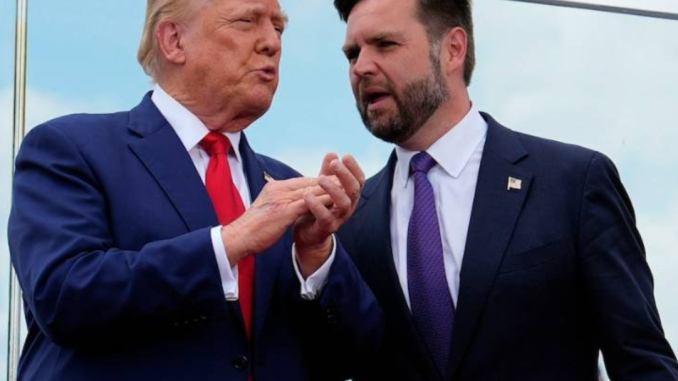
Vance singled out Chief Justice John Roberts in particular, saying comments that the George W. Bush appointee made recently “where he said the role of the court is to check the excesses of the executive,” per the vice president, expressed a “profoundly wrong sentiment,” according to a transcript of Vance’s interview on The New York Times’ “Interesting Times” podcast with columnist Ross Douthat.
{snip}
Vance told Douthat and The Times he believed the courts were “running into a real conflict between two important principles in the United States,” with the first principle being that “courts interpret the law” and the second that “the American people decide how they’re governed,” according to the vice president.
“I think that you are seeing, and I know this is inflammatory, but I think you are seeing an effort by the courts to quite literally overturn the will of the American people,” Vance asserted. “You cannot have a country where the American people keep on electing immigration enforcement and the courts tell the American people they’re not allowed to have what they voted for. That’s where we are right now.”
{snip}
“Success to me is that we have established a set of rules and principles that the courts are comfortable with, and that we have the infrastructure that allows us to deport large numbers of illegal aliens when large numbers of illegal aliens come into the country,” Vance said. “That, to me, is real success. But I think whether we’re able to get there is a function, of course, of our efforts, but also the courts themselves.”
Discussing ways the Trump administration could properly “vindicate” its interpretation of the law, including trying to get the the Supreme Court to rule in its favor on things and legislative efforts to adjust existing law, Vance presented another path.
“There’s a third track, too, which is using existing legal authorities that haven’t been used in the past but we think are there,” Vance told Douthat.
The interview comes as the Trump administration continues to deal with lawsuits and court decisions related to allegations of civil rights violations and legal mandates being ignored in immigration cases across the country.
{snip}
Attorneys representing Kilmar Abrego Garcia, a Maryland man who was deported to El Salvador despite his protected status, have accused the Trump administration of defying a federal judge and the U.S. Supreme Court by refusing to provide any information regarding what has been done to “facilitate” his return to the United States after he was shipped off in March. Abrego Garcia’s case stems from the government’s use of the Alien Enemies Act of 1798 (AEA), a wartime authority previously invoked only three times, the last of which was during World War II.
Pressed on Trump’s application of the AEA today and interpretation of it, Vance claimed migrants aren’t viewed as “uniformed combatants.”
They’re “dangerous people,” according to the vice president, who are “intentionally” coming to the U.S. and bringing “premodern brutality” and violence with them, he said.
“When you say there aren’t five million people who are waging war, OK, but are there thousands, maybe tens of thousands of people?” Vance asked. “And then when you take their extended family, their networks, is it much larger than that?”
{snip}
“This is not sustainable,” he stated. “This is a level of invasion that I think we already have laws to help us deal with. I wish the courts were more deferential. We’re [in the] very early innings in the court process, and even some of the capital-W worst Supreme Court decisions that have been made, the media says: ‘Oh, this is a big blow to the administration.’ A lot of these things are very narrow procedural rulings. I think that we’re [in the] very early innings here on what the court is going to interpret the law to mean.”
Asked why recent crime statistics weren’t showing evidence of such an “invasion,” Vance claimed “sometimes” the stats don’t always tell the whole story.
“The people who are most victimized by this, they’re not running to the F.B.I., they’re not running to the local police,” Vance claimed. “But certainly, if you look at the number of people dying of fentanyl overdoses — again, just go substantively, qualitatively.”
{snip}
“I believe, and we’re getting into the weeds, a little bit of the legal technicalities, but I believe the court term is you must ‘facilitate’ his return,” Vance said about the Supreme Court’s order in the case. “I sat in lunch with Bukele, the leader of El Salvador, with the president of the United States and with others, and talked about this case. And Bukele basically said, ‘I don’t want to send this guy back. I think he’s a bad guy. He’s my citizen. He’s in a prison in El Salvador, and I think that’s where he belongs.’ And our attitude was, ‘OK, what are we really going to do? Are we going to exert extraordinary diplomatic pressure to bring a guy back to the United States who’s a citizen of a foreign country who we had a valid deportation order with?’”